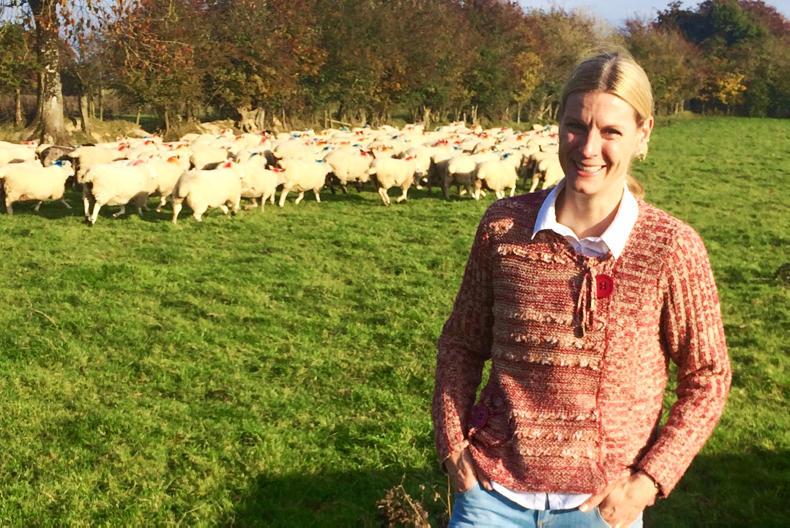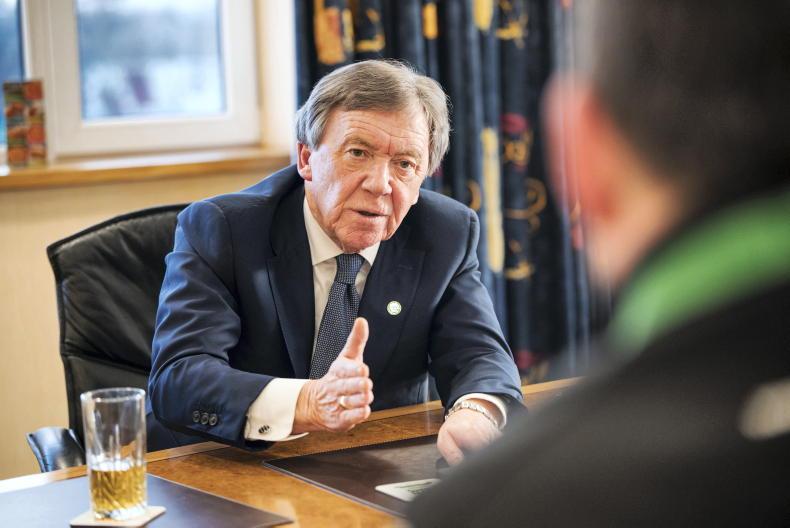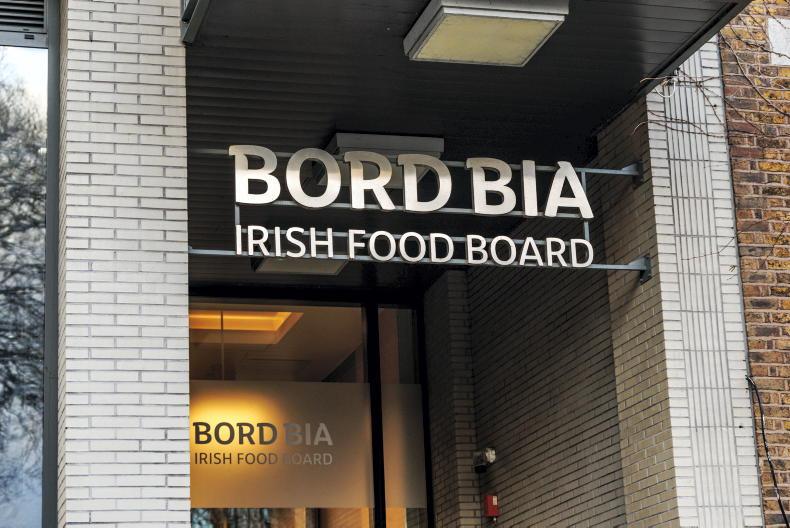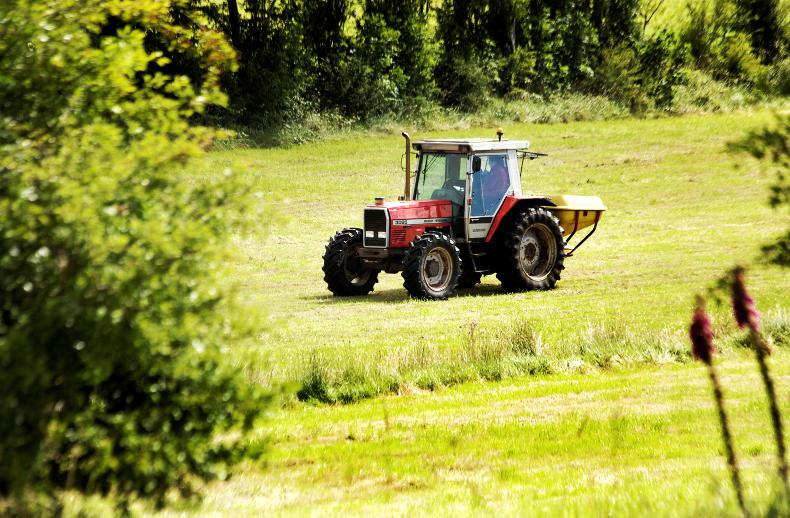Pippa Hackett, spokesperson for agriculture in the Green Party, was appointed just before Budget 2017. The Fine Gael-led minority Government formed in May, so why did it take four months before the party appointed an ag spokesperson?
“After the election in February, the Government took a bit of time to form,” said Hackett. “We’ve only just come together as a party to put those spokesperson positions into place.”
Hackett, a mother of four, living and working on an organic beef and sheep farm in Co Offaly, joined the party about a year ago, not with any huge desire to get into politics, she says, but to help fund them when they were out of government.
“You don’t get any funding if you’re not in government,” she explained.
It was a bit of fresh air compared to the standard political rhetoric from the other parties
“Before I joined the party, I read through the Green Party policies and there was a lot there I could feel an affinity with, both as a woman and a mother. It was a bit of fresh air compared to the standard political rhetoric from the other parties.”
Hackett, who is from Co Mayo, has a degree in agricultural science from the University of Essex, a postgraduate diploma in equine science from UCD and a PhD in equine biomechanics from the University of Limerick. Near the turn of the millennium, she moved to Co Offaly to help farm a suckler-to-beef and sheep enterprise with Mark, her husband of 15 years. About two years ago, the family converted to organics.
The mother of four feels the fact that she is a farmer will stand her in good stead, as a criticism often levelled at environmentalists is that they have no hands-on experience of farming and so they are not qualified to direct policy on this subject.
Herd expansion
Inevitably, the subject of the historical clash between the environmental lobby and agricultural lobby frequently surfaces during our interview, as it is rare the two groups see eye to eye. Agriculture accounts for over 40% of Ireland’s carbon emissions, and environmentalists and farm organisations seem to be engaged in a protracted tussle over how best to reduce this footprint. The former wants to reduce herd sizes, the latter to maintain or expand.
Despite her role as agriculture spokesperson, Hackett generally toes the party line when it comes to environmental policies.
We can try to feed as many people as we can but we are never going to feed the world
She is adamant that herd expansion and growth in the value of our food exports, as espoused in the Government’s roadmaps for the agriculture sector, Food Harvest 2020 and Food Wise 2025, are not the way forward: “We do produce great quality food and, yes, we can try to feed as many people as we can but I don’t think that’s the way to go,” she said. “We are never going to feed the world. For us to chase that forever is not sustainable. We can’t keep expanding because that’s not going to achieve what we need to do in terms of reaching our climate emission reduction targets.”
Mental health
Hackett is cautious about the encouragement farmers are getting to expand not just from an environmental point of view. She is also cognisant of the mental pressures it can place on our food producers.
“Farmers in a way are blessed to have this wonderful quality of life – you are flexible to a degree, you are working outdoors. So how about not measuring human success in terms of economic growth but in terms of a quality of life?
Farming is tough even if you’re a small farmer – why make it tougher?
“Depression is what happens when you get bigger and bigger and the money is not coming in,” she continued. “Farming is tough even if you’re a small farmer – why make it tougher and more stressful by borrowing huge amounts of money and so forth?”
New markets
Is she opposed then to the opening of new markets such as China, the US, Canada and Turkey to Irish beef and dairy?
“To say we’ll produce more cattle here to send to China is not really the answer,” said Hackett. “At the end of the day, China will be looking to countries that are bigger than us to get their food.”
Hackett acknowledges the argument put forward by Irish farm organisations that if Ireland, with its lowest carbon footprint in dairy and fifth lowest carbon footprint in beef, does not produce food to send abroad, other countries with less sustainable methods will produce it instead, to the greater detriment of the environment.
Our system will only be sustainable for so long at the rate of the expansion required to meet the targets
“But our system will only be sustainable for so long at the rate of the expansion required to meet the targets,” she argued. “Ireland should be a special case – we have a uniqueness and we should concentrate on quality rather than quantity. Asking farmers to get bigger and bigger is not sustainable.”
Climate change targets
Last December in Paris, countries around the world, including Ireland, adopted the first ever legally binding global climate agreement. The deal has a long-term goal to keep temperatures to well below 2°C above pre-industrial levels.
This agreement feeds into climate deals made at European level, and in July this year, Ireland received its climate targets for 2030 from the European Commission. As well as being tasked with cutting emissions by 30% compared with 2005 levels, Ireland achieved high flexibility on the use of forestry or grassland management to offset up to 5.6% of its cuts in emissions – the highest flexibility offered to any member state bar Latvia.
Was Hackett disappointed that Ireland achieved flexibility on our climate target agreements?
“I don’t think it’s a good way to go really,” she said. “The targets are there for a reason and powers that are greater than Ireland have decided this. I don’t think it is really fair that we’re getting a special flexibility on carbon emissions.”
Data from Teagasc suggests that if we follow the Food Wise strategies, there is no way we will be able to meet our carbon emission reduction targets
This interviewer challenges Hackett to give credit where it is due by listing off some of the measures the Government is taking to address the carbon footprint of our agricultural sector as part of the Food Wise strategies. These include cost-benefit analyses for dairy in relation to mitigation measures for ammonia emissions, research into the potential reduction of methane generation arising from beef cattle, an annual report detailing the results of analysis of GHG emissions arising from agriculture and Bord Bia’s Origin Green programme.
“All the cost benefit analyses and other measures are well and good,” she said, “but even data from Teagasc suggests that if we follow the Food Wise strategies, there is no way we will be able to meet our carbon emission reduction targets.
“Also, the Paris agreement is a worldwide agreement,” she added. “It’s not something we can wriggle out of so easily. And who knows what the consequences are? If we get lumped with some big fine in 2020 or 2030 for not meeting our targets, where is that money going to come from?”
Origin Green
On Origin Green specifically, the sustainability programme for Irish food producers launched by Bord Bia in 2012, Hackett is ambivalent: “On the whole, it’s a nice idea,” she said. “But I think it’s a bit big, for want of a better word, for your ordinary family farm. I think smaller farmers feel it’s nothing to do with them. They’re just on their farm with their wellies while Origin Green is all glossy and they’re all off to Paris for three days on a trade show.”
She also says there are contradictions between Government decisions and the Origin Green ethos.
For example, in mid-October, the Government opposed a proposed ban on the continued use of pesticides in Ecological Focus Areas (EFAs). “That decision goes against the Origin Green idea,” she said. “So there are contradictions with it”.
Land diversification
Land diversification is a topic that is close to Hackett’s heart and it comes up repeatedly throughout the interview.
Like her son Charlie, 13, who wrote a letter to the Irish Farmers Journal last week to complain about negative headlines in the paper, Hackett believes that agricultural media has a role to play in highlighting success stories that other farmers can take inspiration from.
There are good stories out there about farmers who diversify and turn their enterprise around and the media could do with highlighting more of those
“If farmers are not making money from their farm, something has to change,” she said. “Farmers should look at doing something different. We can’t keep doing the same thing year in, year out and expect a different result. We need to be proactive rather than reactive. There are good stories out there about farmers who diversify and turn their enterprise around and the media could do with highlighting more of those.”
Hackett says that turning their farm into an organic enterprise two years ago was one of the best decisions the family ever made.
“It focused us in a good way. Our farm has become more profitable as a result. But that’s probably because we made the decision and we were passionate about it.”
Achievability of the Green Party vision
Hackett believes in the small family farms of Ireland and sees the Green Party as a champion of these types of farm enterprises: “The small family farm is what has shaped Ireland as a country over the years. It’s linked to our tourism image and that image is valuable and it will sell our product. We are a green island and we should be striving to preserve that.”
Does Hackett think the Green Party’s vision for agriculture is achievable given the size of the party and the variation between some of its key policies and those of the main farming lobby groups?
“I think it is,” Hackett said, “because we have a few more rural people involved in the party this time (Senator Grace O’Sullivan, previously an activist with environmental group Greenpeace, is on the agricultural panel) and we’ve recently been speaking to a few delegates from the Irish Farmers Association (IFA). So we are trying to get that dialogue going.
Maybe there does need to be a softening on both sides between environment and agriculture
“There does seem to have been a historical divide between environment and agriculture,” she continued, “but the IFA aren’t climate change deniers nor is Teagasc, so that is as good a place as any to start. But maybe there does need to be a softening on both sides of the divide.”
Hackett is firmly of the opinion that the Green Party, which won back two seats in the 2016 general election, can overcome the memory of the disastrous 2011 general election, in which the party lost all six of its seats. In fact, she believes it will only become more relevant as time passes.
“Green issues are coming to the fore all of the time in a worldwide sense,” she said. “There is a desire among the public as a whole to understand a bit more about climate change and the Greens have a very important role to play in this. The party occupies a very specific political sphere that isn’t occupied by anyone else.”
Read more
Passing of anti-fracking bill welcomed
Pippa Hackett, spokesperson for agriculture in the Green Party, was appointed just before Budget 2017. The Fine Gael-led minority Government formed in May, so why did it take four months before the party appointed an ag spokesperson?
“After the election in February, the Government took a bit of time to form,” said Hackett. “We’ve only just come together as a party to put those spokesperson positions into place.”
Hackett, a mother of four, living and working on an organic beef and sheep farm in Co Offaly, joined the party about a year ago, not with any huge desire to get into politics, she says, but to help fund them when they were out of government.
“You don’t get any funding if you’re not in government,” she explained.
It was a bit of fresh air compared to the standard political rhetoric from the other parties
“Before I joined the party, I read through the Green Party policies and there was a lot there I could feel an affinity with, both as a woman and a mother. It was a bit of fresh air compared to the standard political rhetoric from the other parties.”
Hackett, who is from Co Mayo, has a degree in agricultural science from the University of Essex, a postgraduate diploma in equine science from UCD and a PhD in equine biomechanics from the University of Limerick. Near the turn of the millennium, she moved to Co Offaly to help farm a suckler-to-beef and sheep enterprise with Mark, her husband of 15 years. About two years ago, the family converted to organics.
The mother of four feels the fact that she is a farmer will stand her in good stead, as a criticism often levelled at environmentalists is that they have no hands-on experience of farming and so they are not qualified to direct policy on this subject.
Herd expansion
Inevitably, the subject of the historical clash between the environmental lobby and agricultural lobby frequently surfaces during our interview, as it is rare the two groups see eye to eye. Agriculture accounts for over 40% of Ireland’s carbon emissions, and environmentalists and farm organisations seem to be engaged in a protracted tussle over how best to reduce this footprint. The former wants to reduce herd sizes, the latter to maintain or expand.
Despite her role as agriculture spokesperson, Hackett generally toes the party line when it comes to environmental policies.
We can try to feed as many people as we can but we are never going to feed the world
She is adamant that herd expansion and growth in the value of our food exports, as espoused in the Government’s roadmaps for the agriculture sector, Food Harvest 2020 and Food Wise 2025, are not the way forward: “We do produce great quality food and, yes, we can try to feed as many people as we can but I don’t think that’s the way to go,” she said. “We are never going to feed the world. For us to chase that forever is not sustainable. We can’t keep expanding because that’s not going to achieve what we need to do in terms of reaching our climate emission reduction targets.”
Mental health
Hackett is cautious about the encouragement farmers are getting to expand not just from an environmental point of view. She is also cognisant of the mental pressures it can place on our food producers.
“Farmers in a way are blessed to have this wonderful quality of life – you are flexible to a degree, you are working outdoors. So how about not measuring human success in terms of economic growth but in terms of a quality of life?
Farming is tough even if you’re a small farmer – why make it tougher?
“Depression is what happens when you get bigger and bigger and the money is not coming in,” she continued. “Farming is tough even if you’re a small farmer – why make it tougher and more stressful by borrowing huge amounts of money and so forth?”
New markets
Is she opposed then to the opening of new markets such as China, the US, Canada and Turkey to Irish beef and dairy?
“To say we’ll produce more cattle here to send to China is not really the answer,” said Hackett. “At the end of the day, China will be looking to countries that are bigger than us to get their food.”
Hackett acknowledges the argument put forward by Irish farm organisations that if Ireland, with its lowest carbon footprint in dairy and fifth lowest carbon footprint in beef, does not produce food to send abroad, other countries with less sustainable methods will produce it instead, to the greater detriment of the environment.
Our system will only be sustainable for so long at the rate of the expansion required to meet the targets
“But our system will only be sustainable for so long at the rate of the expansion required to meet the targets,” she argued. “Ireland should be a special case – we have a uniqueness and we should concentrate on quality rather than quantity. Asking farmers to get bigger and bigger is not sustainable.”
Climate change targets
Last December in Paris, countries around the world, including Ireland, adopted the first ever legally binding global climate agreement. The deal has a long-term goal to keep temperatures to well below 2°C above pre-industrial levels.
This agreement feeds into climate deals made at European level, and in July this year, Ireland received its climate targets for 2030 from the European Commission. As well as being tasked with cutting emissions by 30% compared with 2005 levels, Ireland achieved high flexibility on the use of forestry or grassland management to offset up to 5.6% of its cuts in emissions – the highest flexibility offered to any member state bar Latvia.
Was Hackett disappointed that Ireland achieved flexibility on our climate target agreements?
“I don’t think it’s a good way to go really,” she said. “The targets are there for a reason and powers that are greater than Ireland have decided this. I don’t think it is really fair that we’re getting a special flexibility on carbon emissions.”
Data from Teagasc suggests that if we follow the Food Wise strategies, there is no way we will be able to meet our carbon emission reduction targets
This interviewer challenges Hackett to give credit where it is due by listing off some of the measures the Government is taking to address the carbon footprint of our agricultural sector as part of the Food Wise strategies. These include cost-benefit analyses for dairy in relation to mitigation measures for ammonia emissions, research into the potential reduction of methane generation arising from beef cattle, an annual report detailing the results of analysis of GHG emissions arising from agriculture and Bord Bia’s Origin Green programme.
“All the cost benefit analyses and other measures are well and good,” she said, “but even data from Teagasc suggests that if we follow the Food Wise strategies, there is no way we will be able to meet our carbon emission reduction targets.
“Also, the Paris agreement is a worldwide agreement,” she added. “It’s not something we can wriggle out of so easily. And who knows what the consequences are? If we get lumped with some big fine in 2020 or 2030 for not meeting our targets, where is that money going to come from?”
Origin Green
On Origin Green specifically, the sustainability programme for Irish food producers launched by Bord Bia in 2012, Hackett is ambivalent: “On the whole, it’s a nice idea,” she said. “But I think it’s a bit big, for want of a better word, for your ordinary family farm. I think smaller farmers feel it’s nothing to do with them. They’re just on their farm with their wellies while Origin Green is all glossy and they’re all off to Paris for three days on a trade show.”
She also says there are contradictions between Government decisions and the Origin Green ethos.
For example, in mid-October, the Government opposed a proposed ban on the continued use of pesticides in Ecological Focus Areas (EFAs). “That decision goes against the Origin Green idea,” she said. “So there are contradictions with it”.
Land diversification
Land diversification is a topic that is close to Hackett’s heart and it comes up repeatedly throughout the interview.
Like her son Charlie, 13, who wrote a letter to the Irish Farmers Journal last week to complain about negative headlines in the paper, Hackett believes that agricultural media has a role to play in highlighting success stories that other farmers can take inspiration from.
There are good stories out there about farmers who diversify and turn their enterprise around and the media could do with highlighting more of those
“If farmers are not making money from their farm, something has to change,” she said. “Farmers should look at doing something different. We can’t keep doing the same thing year in, year out and expect a different result. We need to be proactive rather than reactive. There are good stories out there about farmers who diversify and turn their enterprise around and the media could do with highlighting more of those.”
Hackett says that turning their farm into an organic enterprise two years ago was one of the best decisions the family ever made.
“It focused us in a good way. Our farm has become more profitable as a result. But that’s probably because we made the decision and we were passionate about it.”
Achievability of the Green Party vision
Hackett believes in the small family farms of Ireland and sees the Green Party as a champion of these types of farm enterprises: “The small family farm is what has shaped Ireland as a country over the years. It’s linked to our tourism image and that image is valuable and it will sell our product. We are a green island and we should be striving to preserve that.”
Does Hackett think the Green Party’s vision for agriculture is achievable given the size of the party and the variation between some of its key policies and those of the main farming lobby groups?
“I think it is,” Hackett said, “because we have a few more rural people involved in the party this time (Senator Grace O’Sullivan, previously an activist with environmental group Greenpeace, is on the agricultural panel) and we’ve recently been speaking to a few delegates from the Irish Farmers Association (IFA). So we are trying to get that dialogue going.
Maybe there does need to be a softening on both sides between environment and agriculture
“There does seem to have been a historical divide between environment and agriculture,” she continued, “but the IFA aren’t climate change deniers nor is Teagasc, so that is as good a place as any to start. But maybe there does need to be a softening on both sides of the divide.”
Hackett is firmly of the opinion that the Green Party, which won back two seats in the 2016 general election, can overcome the memory of the disastrous 2011 general election, in which the party lost all six of its seats. In fact, she believes it will only become more relevant as time passes.
“Green issues are coming to the fore all of the time in a worldwide sense,” she said. “There is a desire among the public as a whole to understand a bit more about climate change and the Greens have a very important role to play in this. The party occupies a very specific political sphere that isn’t occupied by anyone else.”
Read more
Passing of anti-fracking bill welcomed










SHARING OPTIONS